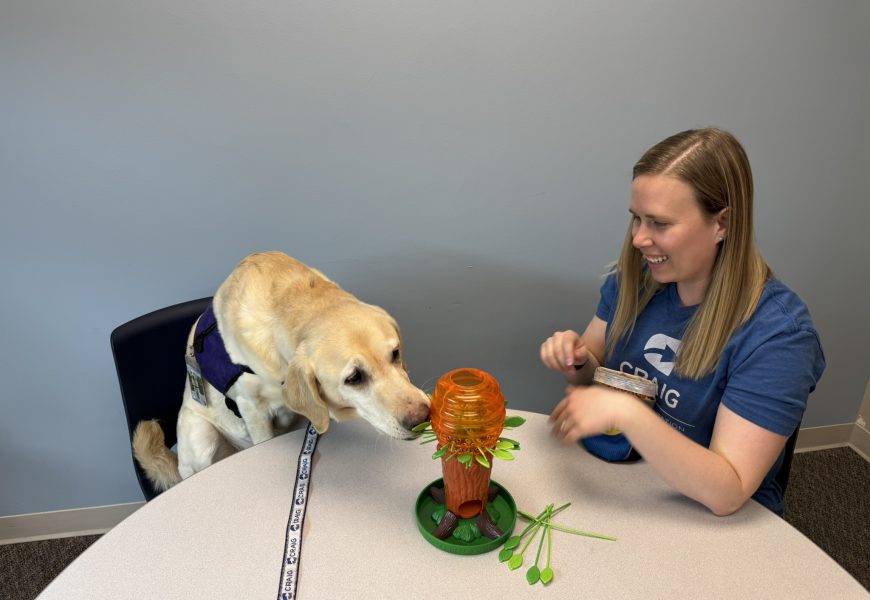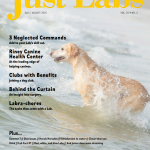Lab proves powerful for patient rehabilitation and recovery at Craig Hospital.
by Jen Reeder
Lead photo: Kelly Secor, CTRS, a Therapeutic Recreation Technician at Craig Hospital, playes a game with Hercules.
The woman stared into the deep brown eyes of the Lab sitting across from her. She had a challenging time speaking due to a traumatic brain injury, which is how she found herself in Craig Hospital, a neurorehabilitation facility in metro Denver that specializes in caring for patients with brain and spinal cord injuries.
The dog’s handler, Steve Erickson, introduced her to Hercules, and handed her a bag of dog treats. The food-motivated Lab latched onto her with a laser stare, hoping to earn a reward.
A physical therapist wrote the word “shake” on a whiteboard, urging the woman to say it to Hercules. She did – and he offered a paw. They spent the next hour connecting while she said words like “sit” and “good boy” – to the amazement and delight of the two physical therapists in the room.
“The words were coming so much more easily with a dog there,” Erickson recalls. “It’s hard to convey the magic that happens when Hercules connects with a patient.”
Once a week for the past two years, Hercules and Erickson have volunteered in Craig Hospital’s animal-assisted intervention program. They work with physical, speech, occupational, and recreational therapists to help patients develop communication and fine motor skills during neurorehabilitation. Many patients start their rehabilitation after emerging from medically induced comas following serious injuries.
Essentially, Hercules helps motivate patients by making rehab more fun.
“They might want them to start turning their body in a certain direction or using an arm that isn’t their better arm, so they can pet the dog with a certain hand,” Erickson explains. “We can put Hercules on their left side, let’s say, to get them to look over that way and sit up straight. We can work him into any therapy that people are doing.”
Some patients roll a ball for Hercules to fetch, or ask him to carry a beanbag to deposit in a cornhole board. One popular game is “honeybee tree,” where Hercules holds toy sticks in his mouth for patients to grasp and remove.
Another motivating game involves testing Hercules with “wait.” Erickson might place a dog treat on a patient’s leg and tell him to wait, explaining to the patient that the well-trained Lab won’t eat the treat until they give a release command of “okay.”
“I’ll warn them that we’ll be drowning in drool soon, so please say the release word,” he says with a chuckle.
Sometimes that makes family members with Labs smile, since they understand all-too-well about how food-motivated the breed can be – to which he’ll quip, “I see you’re fluent in Lab.”
Hercules is beloved for many reasons, including his signature move: passing out his trading cards. Erickson will clip a trading card into a clothespin, which Hercules can gingerly carry in his mouth to an outstretched hand. On Valentine’s Day, he delivers roses (with the thorns removed) and cards to patients and staff.
“Valentine’s Day is always a hit,” Erickson says. “He makes people so happy.”
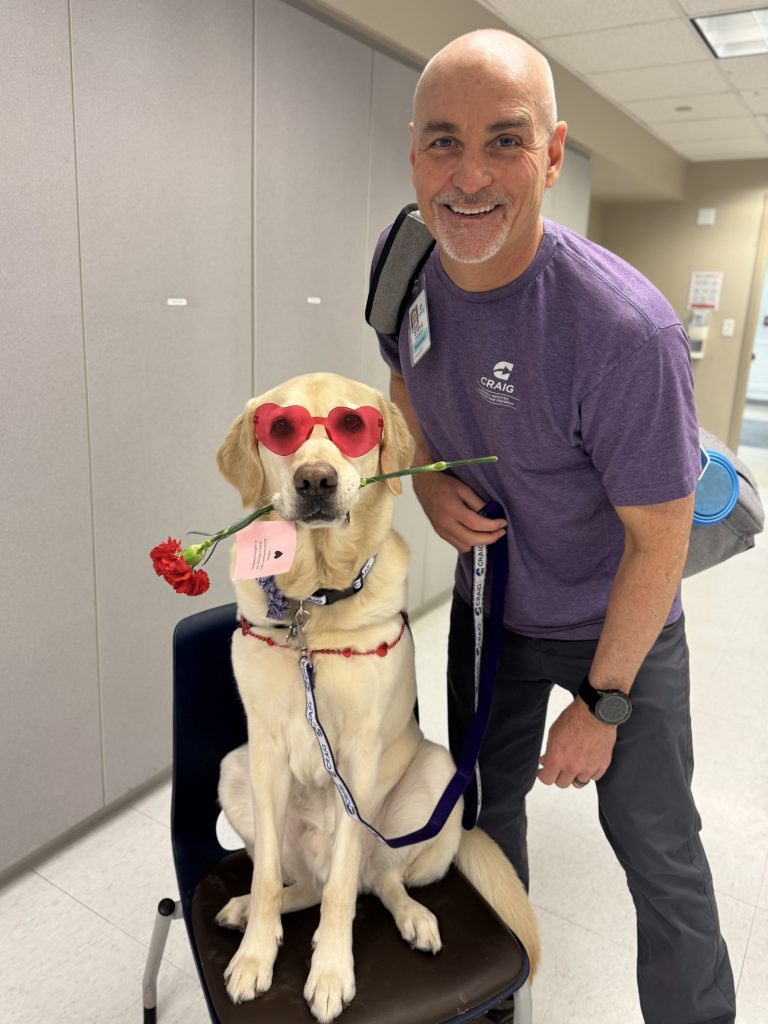
Because Hercules visits patients once a week, Erickson witnesses incredible progress. He marvels at the amount of physical and mental energy patients put into their recovery and admires the hospital staff for creating innovative ways to tailor rehabilitation plans for each patient, like including dogs.
“I see so much improvement in patients with my weekly snapshots,” he says. “Sometimes they go from being in a wheelchair to sitting on the edge of the PT mat to standing up to walking. Craig is a great place for patients to rehab and rebuild themselves after injuries.”
He fondly remembers a patient they’d visited for six months who progressed so much that she was ready to take a walk on the hospital grounds. Erickson clipped two leashes into his dog’s collar; the woman held the longer leash while he held a short one to make sure there was no tension on her leash that could knock her off balance.
She kept the treat bag clipped around her waist, and Hercules walked at a perfect heel, looking at her for direction.
“She said, ‘I’m outside walking a dog. This is the best part of my day,’” Erickson recalls. “Then she said, ‘No, this is the best part of my week.’ And then she said, ‘No, this is my best day here.’”
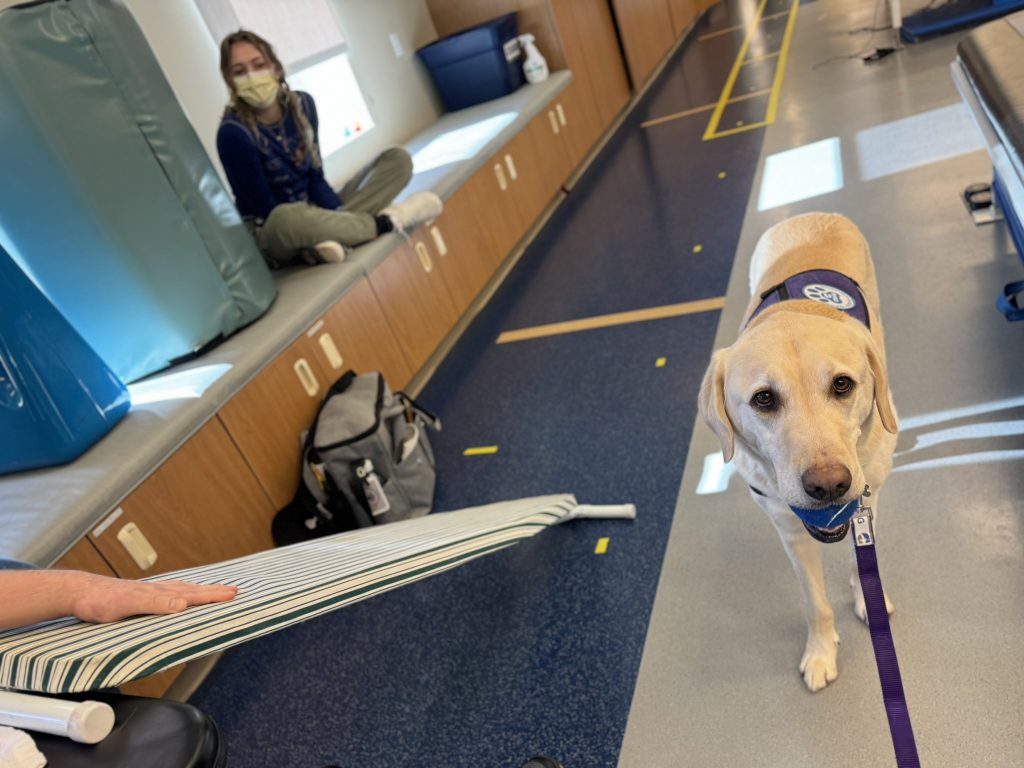
Clearly, Hercules has found his calling. So it can be surprising for his fans to learn that working in animal-assisted interventions is a change of career for him.
Erickson and his family – Kathy, his wife, and their son Paxton and daughter Caroline – were volunteer puppy raisers for Hercules from March of 2017 to November of 2018 for the nonprofit Canine Companions, which trains service dogs for people with disabilities.
Despite being smart, friendly, and biddable, Hercules was released from the program during professional training for alert barking – he excitedly barks when the doorbell rings or a car door slams. When Canine Companions offered to let the Ericksons adopt him permanently, they didn’t hesitate.
Since Hercules, who is a Lab-golden mix, was bred and raised to have a job out in the world, Erickson decided to put him to work as a therapy dog. Initially, it was a tricky transition, because service dogs are trained to assist only their handler, while therapy dogs are meant to provide comfort to everyone they meet.
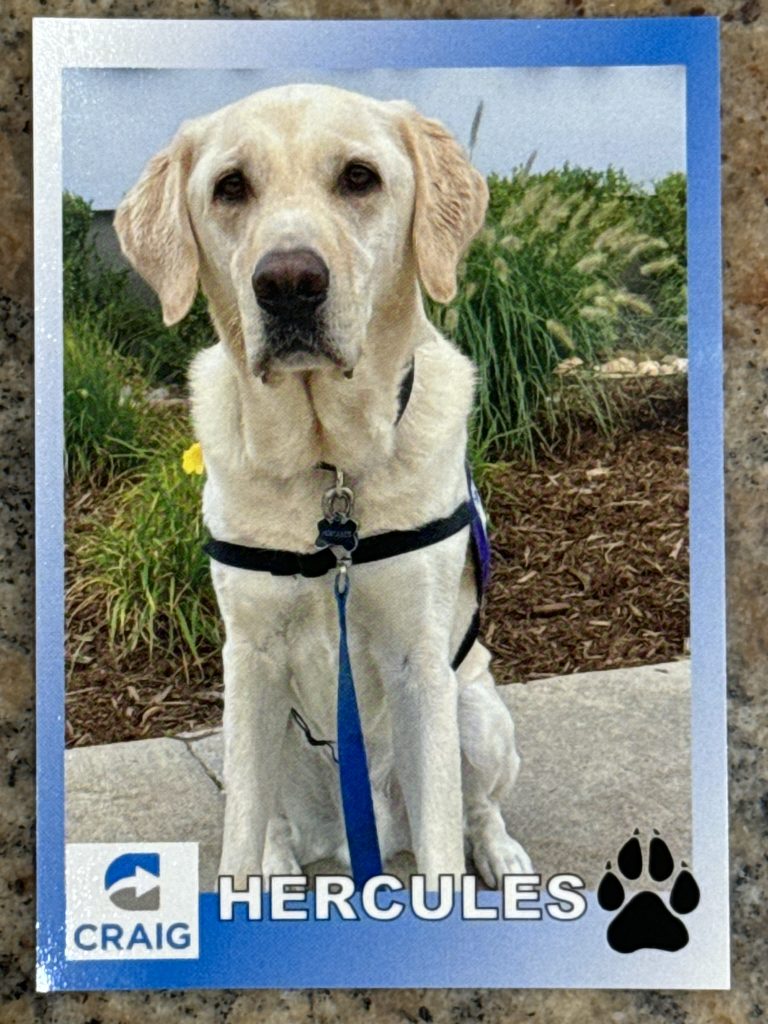
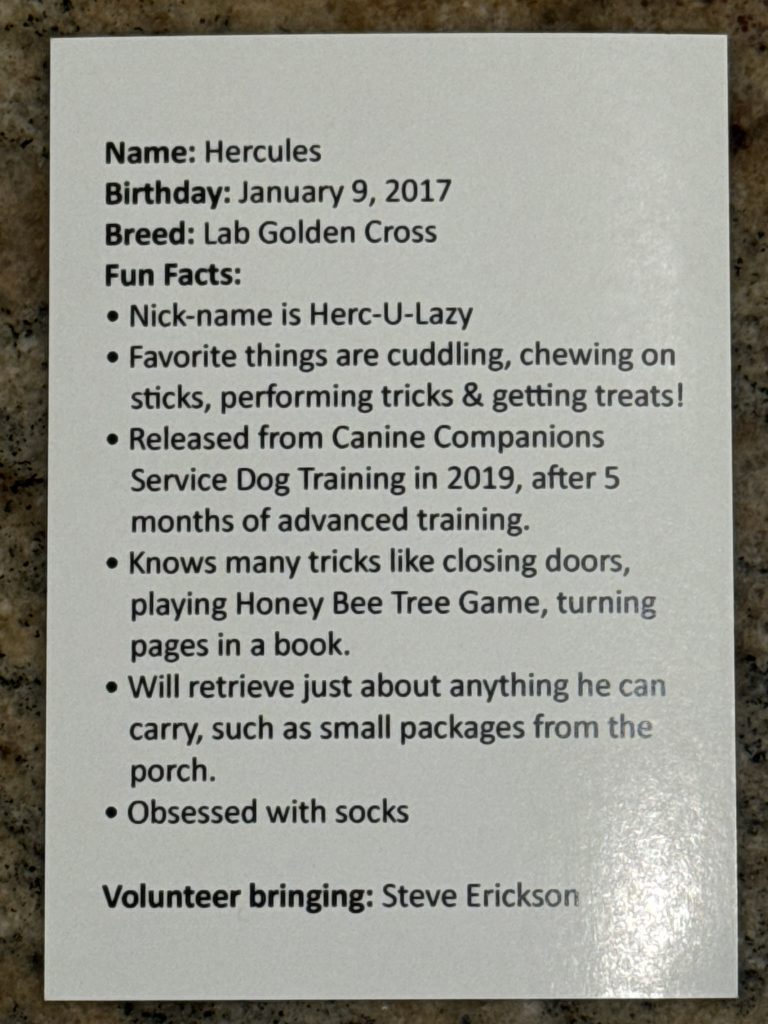
With the animal-assisted interventions, Hercules could learn to focus more on an individual patient. Erickson would sit on the floor, exuding a relaxed attitude. He’d give the treat bag to a patient and if Hercules looked at him for permission to give his attention to someone else, Erickson encouraged him to do so.
Thanks to that initial work and their trusting relationship, they’ve become an incredibly successful team, according to Lori Womeldorff, the certified therapeutic recreation specialist who runs the animal program at Craig Hospital (and has two Labs of her own: Maya, a black Lab, and Casey, a yellow Lab).
“It’s been really amazing in the last couple of years to watch how they’ve grown as a team,” she says. “Steve is just such a wonderful human being. His genuine nature invites everybody in, and Hercules has taken that on as well. He can do so many different things.”
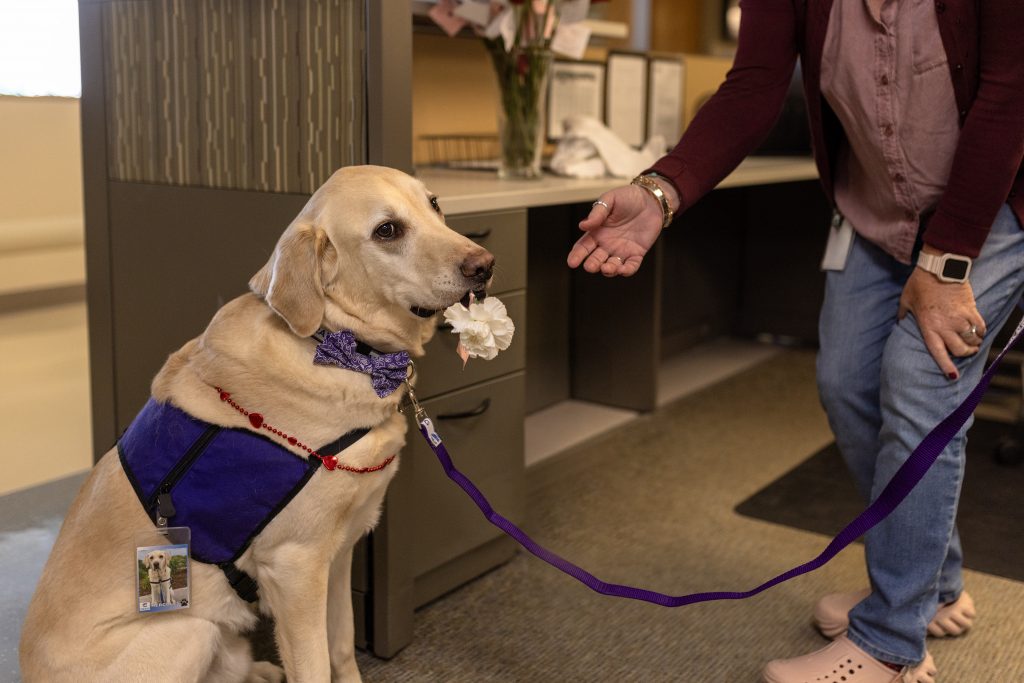
For instance, she’s seen Hercules turn pages of a book, and show cards for patients to read in speech therapy sessions.
“We’ve had patients who never said anything, and then we’ve had Hercules in a session and the speech therapist says, ‘That’s the most I’ve ever heard her say,’” Womeldorff says. “He’s just really motivating.”
He’s also shown intuition. Once, when a patient battling anxiety and depression was screaming during a session, Hercules ran to her, and she “became a different person.”
Such positive interactions are the reason why Erickson, a real estate agent who also happens to be a kidney donor, is so passionate about volunteering with Hercules. Plus, Hercules loves putting on his vest and heading to work.
Erickson hopes other dog lovers will consider volunteering at their local hospitals with Labs or even puppy raising for service dog organizations because it’s such a win for everyone involved.
“What dogs give the world of people is unbelievable,” he says. “It’s just amazing.”
For more information, visit: craighospital.org/foundation/programs/pet-therapy.

